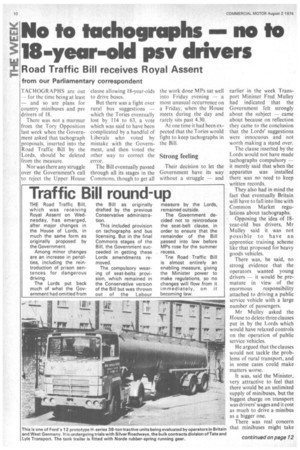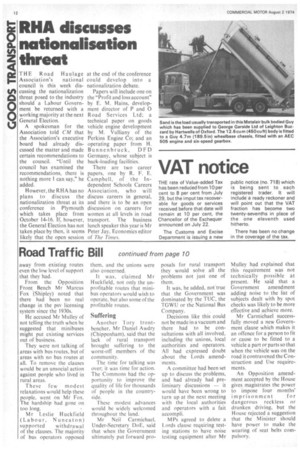No to tachographs no to 18-year-old psv drivers
Page 12

Page 14

If you've noticed an error in this article please click here to report it so we can fix it.
Road Traffic Bill receives Royal Assent
from our Parliamentary correspondent
TACHOGRAPHS are out for the time being at least — and so are plans for country minibuses and psv drivers of 18.
There was not a murmur from the Tory Opposition last week when the Government asked that tachograph proposals, inserted into the Road Traffic Bill by the Lords, should be deleted from the measure.
Nor was there any struggle over the Government's call to reject the Upper House clause allowing 18-year-olds to drive buses.
But there was a fight over rural bus suggestions — which the Tories eventually lost by 114 to 63, a vote which was said to have been complicated by a handful of Liberals who voted by mistake with the Government, and then voted the other way to correct the error, The Bill eventually passed through all its stages in the Commons, though to get all the work done MPs sat well into Friday evening — a most unusual occurrence on a Friday, when the House meets during the day and rarely sits past 4.30.
At one time it had been expected that the Tories would fight to keep tachographs in the Bill.
Strong feeling
Their decision to let the Government have its way without a struggle — and
earlier in the week Transport Minister Fred Mulley had indicated that the Government felt strongly about the subject — came about because on reflection they came to the conclusion that the Lords' suggestions were innocuous and not worth making a stand over,
The clause inserted by the Lords would not have made tachographs compulsory — it merely said that when the apparatus was installed there was no need to keep written records.
They also had in mind the fact that eventually Britain will have to fall into line with Common Market regulations about tachographs.
Opposing the idea of 18year-old bus drivers, Mr Mulley said it was not possible to have an apprentice training scheme like that proposed for heavy goods vehicles.
There was, he said, no strong evidence that the operators wanted young
drivers it would be premature in view of the
enormous responsibility attached to driving a public service vehicle with a large number of passengers.
Mr Mulley asked the House to delete three clauses put in by the Lords which would have relaxed controls on the operation of public service vehicles.
He argued that the clauses would not tackle the problems of rural transport, and in some cases could make matters worse.
It was, said the Minister, very attractive to feel that there would be an unlimited supply of minibuses, but the biggest charge on transport was drivers' wages and it cost as much to drive a minibus as a bigger one.
There was real concern that minibuses might take away from existing routes even the low level of support that they had.
From the Opposition Front Bench Mr Marcus Fox (Shipley) noted that there had been no real change in the psv licensing system since the 1930s.
He accused Mr Mulley of not telling the truth when he suggested that minibuses might put existing services out of business.
They were not talking of areas with bus routes, but of areas with no bus routes at all. To remove the clauses would be an unsocial action against people who lived in rural areas.
These few modest relaxations would help these people, went on Mr Fox. The hardship had gone on too long.
Mr Leslie Huckfield (Labour, Nuneaton) supported withdrawal of the clauses. The majority of bus operators opposed them, and the unions were also concerned.
It was, claimed Mr Huckfield, not only the unprofitable routes that minibus operators would wish to operate, but also some of the profitable routes.
Suffering
Another Tory frontbencher, Mr Daniel Awdry (Chippenham), said that the lack of rural transport brought suffering to the worst-off members of the community.
The time for talking was over; it was time for action. The Commons had the opportunity to improve the quality of life for thousands of people in the countryside.
These modest advances would be widely welcomed throughout the land.
Mr Neil Carmichael, Under-Secretary DoE, said that when the Government ultimately put forward pro
posals for rural transport they would solve all the problems not just one of them.
It was, he added, not' true that the Government was dominated by the TUC, the TGWU or the National Bus Company.
Decisions like this could not be made in a vacuum and there had to be consultations with all involved, including the unions, local authorities and operators. All had expressed doubt about the Lords amendments.
A committee had been set up to discuss the problems, and had already had preliminary discussions — it would have been wrong to turn up at the next meeting with the local authorities and operators with a fait accornpli.
MPs agreed to delete a Lords clause requiring testing stations to have noise testing equipment after Mr Mulley had explained that this requirement was not technically possible at present. He said that a Government amendment adding noise to , the list of subjects dealt with by spot checks was likely to be more effective and achieve more.
Mr Carmichael successfully moved a new Government clause which makes it an offence for a person to fit or cause to be fitted to a vehicle a part or parts so that when the vehicle was on the road it contravened the Construction and Use require-. ments.
An Opposition amendment accepted by the House gives magistrates the power to impose four months' imprisonment for dangerous reckless or drunken driving, but the House rejected a suggestion that the Minister should have power to make the wearing of seat belts compulsory.




























































































